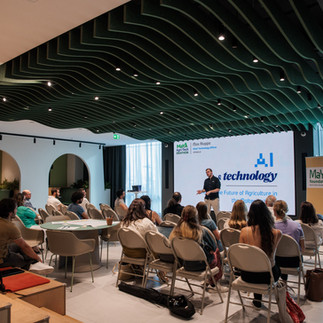MaYA Agri-Tech Ideathon – Co-creating Innovative Solutions for Malta’s Agriculture
- MaYA Foundation

- Oct 18, 2025
- 3 min read
The MaYA Agri-Tech Ideathon, held on Friday, 3rd October 2025 at DiHubMT, marked a significant milestone in Malta’s participation in the PoliRuralPlus project, funded under the EU’s Horizon Europe programme. The project is being implemented locally by AcrossLimits. Organised by the Malta Youth in Agriculture (MaYA) Foundation, the event brought together a diverse group of participants — from farmers and their organisations to researchers, entrepreneurs, students, and professionals in technology and AI — all sharing a common goal: supporting the sustainable future of Maltese agriculture.
The event followed two preparatory webinars held in September, which introduced participants to the objectives of the PoliRuralPlus project, its focus on leveraging AI and digital innovation in rural-urban collaboration, and the three major challenges shaping Malta’s agricultural sector:
1️⃣ Access to agricultural land
2️⃣ Market access & digital integration
3️⃣ Climate & water resilience
Setting the Scene
The Ideathon began with a warm welcome and a short introduction to MaYA’s mission and the organisation’s ongoing role in empowering young people in agriculture. This was followed by a recap of the project’s goals, a brief overview of the identified challenges, and a presentation highlighting the potential of AI and technology to transform the agricultural sector when applied thoughtfully.
A subsequent session showcased several tools and methods developed through PoliRuralPlus and other EU projects that could support group work and idea creation. Participants were guided on what was expected from them during the event and how the provided tools could help structure their ideas effectively.
Engaging Discussions and Interactive Debate
Before dividing into groups, participants took part in an interactive activity designed to spark discussion and reflection. They were presented with five debatable statements related to the identified challenges and asked to position themselves along a spectrum ranging from “Strongly Agree” to “Strongly Disagree.” This exercise helped highlight the diversity of perspectives in the room and fostered a lively exchange of views.
Group Collaboration and Idea Development
Participants were then split into five diverse groups, each composed of individuals from different backgrounds. One group focused on Access to Agricultural Land, while two groups each addressed Market Access & Digital Integration and Climate & Water Resilience.
During the brainstorming phase, facilitators and organisers moved between tables to support discussions and provide feedback. Using the provided templates and guidance, teams developed creative, practical ideas addressing the challenges in Malta’s agricultural context.
Pitching and Judging
Each group had the opportunity to pitch their idea to the audience and a panel of judges, outlining the problem they aimed to solve, their proposed solution, and how it could be implemented locally.
Ideas were evaluated and scored based on the following criteria:
Tackles the real problem (not just the symptom) – 20%
Real utility and relevance of technology – 20%
Potential impact – 20%
Fit for the local context – 20%
Presentation – 10%
Teamwork – 10%
Community and Recognition
Participants also enjoyed locally produced refreshments made from Maltese ingredients. As a token of appreciation, all participants received a bottle of freshly pressed local olive oil. The winning group, with the highest overall score, was awarded a voucher for a local rural tourism experience at a Maltese olive grove — symbolising the connection between innovation and tradition in Maltese agriculture.
Linking Projects and Collaboration
The event also included a short presentation about the COREnet project, in which MaYA’s founder Jeannette Borg is actively involved. COREnet is another EU-funded initiative supporting the development of short food supply chains (SFSC) through a pan-European peer-to-peer learning network for practitioners, aiming to strengthen local markets and advisory systems.
Conclusion
Overall, the MaYA Agri-Tech Ideathon was a successful and inspiring event, demonstrating how collaboration among farmers, researchers, entrepreneurs, and digital experts can generate innovative, context-specific solutions for Malta’s agricultural challenges. It also strengthened the network of stakeholders committed to ensuring the long-term resilience, sustainability, and competitiveness of Malta’s agri-food sector.


















Comments